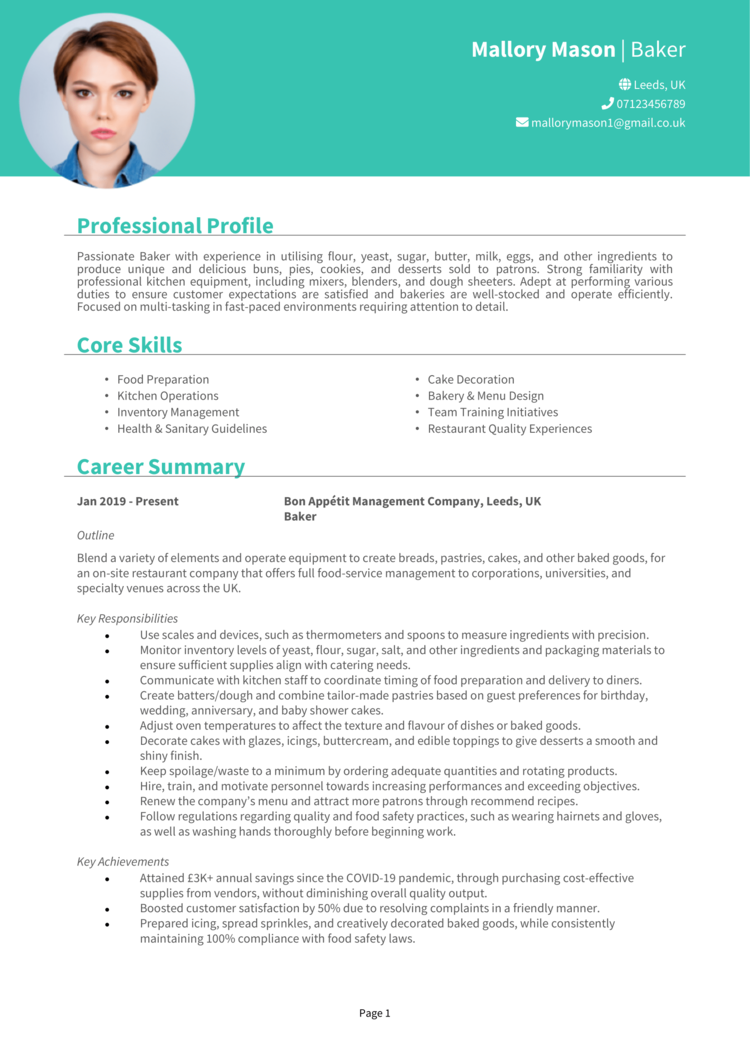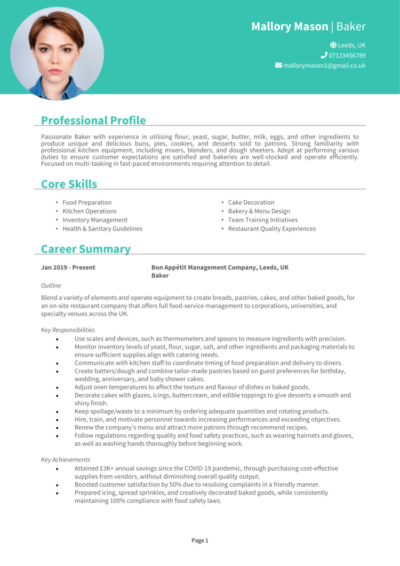If you knead a new job, your CV has to rise above the rest. Whether it’s sourdough or job applications, it all starts with the right recipe.
This guide, with a Baker CV example, will help you shape your experience into a CV that proves you’re the right person to take charge of the dough, the decoration, and everything in between.
Baker CV sample

How to write your Baker CV
Discover how to craft a winning Baker CV that lands interviews with this simple step-by-step guide.
From sourdough starters to perfectly piped pastries, your baking speaks for itself – but your CV has to do some talking too. Whether you’re applying for a position in a high-street bakery or a large-scale production kitchen, your experience and expertise needs to be presented clearly.
These next sections will walk through writing a CV that highlights your technique and ability to deliver the goods – day in and day out.
Structuring and formatting your Baker CV


Every baker knows the value of order – and your CV should follow the same principle. Recruiters and head bakers don’t want a messy layout or vague descriptions full of mistakes: they want to see your experience and training laid out logically. If you make them struggle to see the important details, they’re just going to move onto the next applicant.
Here’s the structure to follow:
- Name and contact details – Place your name and personal details prominently at the top of your CV for quick access. Adding a photo is up to you.
- Profile – Open with a compelling overview of your skills, experience, and career goals.
- Core skills – List your key abilities in this section, focusing on those that will be most relevant to the job.
- Work experience – Provide a detailed breakdown of your work history, starting with the most recent job first.
- Education & certifications – List your qualifications, including degrees and relevant certifications, in reverse chronological order.
- Additional info – Use this optional space for relevant hobbies or personal pursuits that enhance your application.
Use bullet points throughout each section to keep things nice and skimmable. Stick to a clean font, divide sections clearly, and keep your CV no longer than two pages in length. Just like a well-timed recipe, presentation matters: so make sure your format makes your CV as easy and pleasant a reading experience as possible for busy recruiters.
The best way to write a Baker CV profile


Your profile should give a quick but clear impression of who you are as a baker. It’s the first taste a hiring manager will get – so make it count. No matter your specialism, your CV profile should summarise your focus, experience, and what you bring to the team. Rather than listing off some generic spiel, you need to capture the reader’s attention by assuring them of the value you’d bring.
Baker CV profile examples
Profile 1
Skilled and dependable Baker with over six years of experience producing artisan breads, pastries, and cakes in both independent bakeries and high-volume production environments. Proficient in fermentation techniques, dough preparation, and decorative finishes. Known for maintaining high hygiene standards, meeting early shift demands, and delivering consistent quality.
Profile 2
Creative Baker with five years of experience working in patisserie and café settings, specialising in cakes, tarts, and Viennoiserie. Adept at recipe development, ingredient sourcing, and managing baking schedules. Passionate about presentation and flavour, with a strong eye for detail and a focus on customer satisfaction.
Profile 3
Experienced and hard-working Baker with seven years in commercial and retail bakeries, producing a variety of baked goods including sourdough, brioche, and gluten-free products. Familiar with large-scale equipment, inventory control, and food safety compliance. Known for time management, team collaboration, and consistent output under pressure.
Details to put in your Baker CV profile
Here’s what to include:
- Where you’ve worked – Independent bakeries, chains, hotels, or production kitchens.
- Your top qualifications – Baking diplomas, food safety certifications, or hospitality training.
- Essential strengths – Speed, precision, organisation, or creativity.
- Baking focus – Bread, pastries, cakes, gluten-free, large-batch baking, or decorating.
- Work ethic – Punctual, team-focused, and used to early starts or long shifts.
How to present your core skills section properly


This section gives employers a quick summary of what you can bring to the bench. It’s not about listing every technique, but rather showing that you understand baking as both a craft and a system that depends on timing and teamwork. Here’s a tip: scan the job listing for specific keywords which you recruiters will be looking for when they open your CV.
Keep the list of your CV skills tailored to the job: focus on what that bakery or employer is likely to value, and match your strengths to the tasks they need you to perform confidently from day one.
Key skills that make a Baker CV stand out
- Dough Preparation and Mixing – Measuring ingredients accurately and mixing doughs for breads, pastries, and cakes using manual or industrial equipment.
- Bread and Pastry Baking – Producing a wide range of baked goods including sourdough, croissants, buns, and artisan loaves.
- Recipe Development and Customisation – Creating and modifying recipes to suit seasonal menus, dietary needs, or customer preferences.
- Proofing and Fermentation Control – Managing temperature, timing, and humidity to ensure dough rises correctly and consistently.
- Oven Operation and Temperature Control – Operating commercial ovens, monitoring baking times, and adjusting temperatures for optimal results.
- Decorating and Finishing Techniques – Applying icings, glazes, and garnishes to enhance the visual and flavour appeal of baked products.
- Inventory and Ingredient Management – Monitoring stock levels, ordering supplies, and reducing waste through efficient planning.
- Health and Safety Compliance – Following food hygiene regulations, maintaining a clean work environment, and using equipment safely.
- Early Morning and Time Management – Working early shifts and managing baking schedules to meet production and delivery deadlines.
- Customer Service and Sales Support – Interacting with customers in retail bakery settings, taking orders, and providing product recommendations.
How to present your work experience in your CV


This section should show how you’ve gone from flour-covered novice to reliable baker. Employers want to know what kind of kitchen environments you’ve worked in, what types of goods you’ve produced, and how you’ve helped operations run smoothly at each instance of your past work experience.
List your roles in reverse chronological order, starting with your most recent. Include job title, employer, and dates, then use bullet points to describe your day-to-day tasks and any standout responsibilities – whether that’s prepping for a 4am open or managing stock levels behind the scenes.
How should you list jobs on your Baker CV?

- Outline – Briefly describe the bakery or kitchen setting and your role there.
- Responsibilities – Use action verbs like “prepared,” “baked,” “decorated,” or “monitored.”
- Achievements – Include standout achievements: “Reduced product waste,” “Trained two junior bakers,” “Produced over 500 loaves per week with consistent quality.”
Work history examples for Bakers
Baker | Willow Rise Bakery
Outline
Produced a wide range of breads, pastries, and cakes for a popular independent bakery known for traditional methods and high-quality ingredients.
Responsibilities
- Prepared and baked sourdoughs, baguettes, croissants, and seasonal pastries daily.
- Managed dough fermentation and proofing times for optimal flavour and texture.
- Decorated celebration cakes and created custom bakery items upon request.
- Monitored stock levels and ensured timely ingredient ordering with local suppliers.
- Maintained strict cleanliness standards and completed daily HACCP checklists.
Achievements
- Increased daily bread output by 25% without compromising quality.
- Received frequent praise from customers for consistency and freshness.
- Helped train two new team members on bakery equipment and hygiene procedures.
Baker | Hillcrest Hotel and Spa
Outline
Prepared daily fresh baked goods for hotel guests, spa café, and private functions at a 4-star countryside resort.
Responsibilities
- Created morning pastry trays, breads, and desserts for restaurant and buffet service.
- Collaborated with chefs to develop seasonal menus and event-specific baked items.
- Handled early morning shifts, ensuring all items were ready before breakfast service.
- Monitored oven temperatures, baking times, and recipe accuracy.
- Documented allergen information and followed food safety regulations.
Achievements
- Introduced new breakfast items that boosted pastry sales by 30%.
- Consistently met tight service deadlines during high-occupancy periods.
- Recognised by hotel management for creativity and product presentation.
Baker | Harvest Lane Foods Ltd
Outline
Worked in a commercial bakery producing baked goods for regional supermarkets and wholesale clients.
Responsibilities
- Prepared large-scale batches of dough and operated automated mixing and baking machinery.
- Followed standardised recipes and portion controls for consistency.
- Packaged and labelled products according to order specifications and brand guidelines.
- Assisted with quality checks and flagged inconsistencies or faults to supervisors.
- Maintained clean and safe work areas in accordance with food production standards.
Achievements
- Improved production line efficiency by reducing setup times by 15%.
- Maintained perfect attendance record over 18 months.
- Awarded employee of the month for consistently meeting output and quality targets.
Presenting your education history


Whether you’ve trained at college or picked up your skills on the job, your education section helps back up your technical abilities. Start with your most recent or relevant qualifications and work backward.
Include formal baking qualifications, food hygiene training, or any additional kitchen-related courses. If you’re self-taught but experienced, this section can be kept short – just focus on what supports your current skill level.
Best qualifications for a Baker
- NVQ Level 2 or 3 in Bakery or Patisserie and Confectionery – Industry-recognised qualification covering professional baking standards.
- Diploma in Professional Bakery (City & Guilds or equivalent) – A well-rounded qualification for technical and creative baking.
- Food Hygiene and Safety Certification (Level 2 or 3) – Essential for working in any professional kitchen or bakery.
- Apprenticeship in Bakery or Catering – Valuable hands-on training in live kitchen environments.
- Allergen Awareness Certification – Important for bakeries catering to dietary requirements or managing cross-contamination risk.





